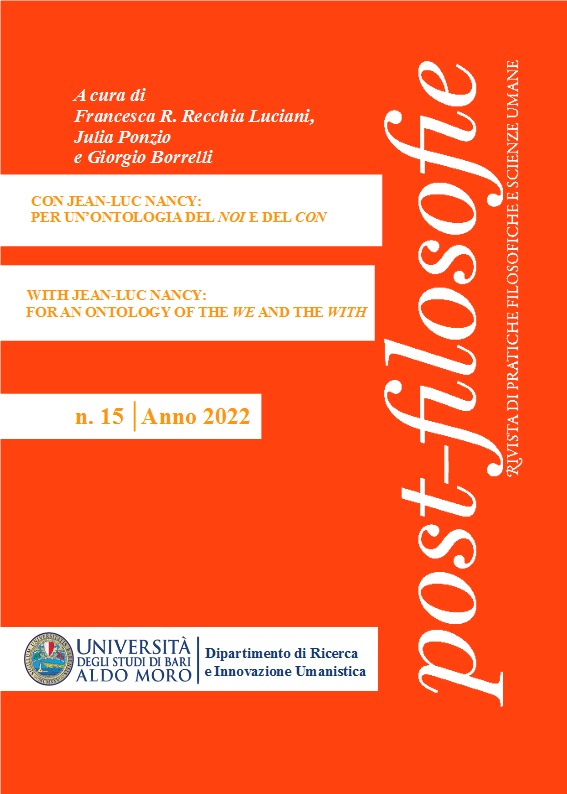Jean-Luc Nancy: La peau du monde. Finitude et existence
DOI:
https://doi.org/10.15162/1827-5133/1824Parole chiave:
Corpo, Decostruzione, Esposizione, Jean-Luc Nancy, Pelle, Body, Deconstruction, Exposition, Skin, Corps, Déconstruction, PeauAbstract
Le thème central de ce texte porte sur la lecture des concepts nancéiens d’exposition (ex-peau-sition), de corporéité, de seuil. A partir de ces concepts, le philosophe français retrace la déconstruction de la pensée occidentale et fait émerger une existence toujours exposée, mise à nu, ouverte, mise en scène. “À fleur de peau” c’est l’expression – ou, si l’on veut, le nouveau sens du monde – qui démantèle les espaces clos et toutes les clôtures.
The text focusses on the concepts of exposure (ex-peau-sition), corporeality and threshold as thematised by Nancy. From these concepts, the French philosopher traces the deconstruction of Western thought and brings out an existence that is always exposed, laid bare, open, staged. “À fleur de peau” is the expression – or, if you like, the new sense of the world – that dismantles closed spaces and all fences.
Riferimenti bibliografici
CALABRÒ D., Dis-piegamenti. Soggetto, corpo e comunità in Jean-Luc Nancy, Mimesis, Milano 2006.
ESPOSITO R., Libertà in comune, introduzione a J.-L. Nancy, L’esperienza della libertà, trad. it. di D. Tarizzo, Einaudi, Torino 2000.
LORELLE Y., Le corps, les rites et la scéne – des origines au XXe siècleI, Edition de l’Amandier, Paris 2003.
NANCY J.-L., Une pensée finie, Galilée, Paris 1990.
―, Corpus, Métailié, Paris 1992.
―, Les muses, Galilée, Paris 1994.
―, La pensée dérobée, Galilée, Paris 2001.
―, La déclosion. (Deconstruction du Christianisme I), Galilée, Paris 2005.
―, Rives, bordes, limites (de la singularité), in J.-L. Nancy, Le poids d’une pensée, l’approche, Éditions de la Phocide, Paris-Strasbourg 2008.
―, Corpo teatro, Cronopio, Napoli 2010.
―, Peau essentielle, in «Estetica. Studi e ricerche» 2016, vol. IV.
―, Sexistence, Galilée, Paris 2017.
NANCY J.-L. e FERRARI F., La pelle delle immagini, Bollati Boringhieri, Torino 2003.
RECCHIA LUCIANI F. R., Corpus, Amore, Sessistenza: critica della ragione tattile e ontologia aptica a partire dalla “filosofia del corpo” di Jean-Luc Nancy, in «Teoria», XLI,/2021/2, pp. 77-98.
―, Jean-Luc Nancy, Feltrinelli, Milano 2022.
RILKE R. M., Le livre de la pauvreté et de la mort, trad. fr. de A. Adamov, Actes Sud, Paris 1992.
VILLANI M., Arte della fuga. Estetica e democrazia nel pensiero di Jean-Luc Nancy, Mimesis, Milano 2020.
Downloads
Pubblicato
Fascicolo
Sezione
Licenza
“Post-Filosofie” utilizza Open Journal Systems 2.4.8.5, che è un software open source per la gestione e la pubblicazione di riviste sviluppato, supportato e distribuito gratuitamente dal Public Knowledge Project sotto la GNU General Public License.
Gli autori che pubblicano su questa rivista accettano le seguenti condizioni:
- Gli autori mantengono i diritti sulla loro opera e cedono alla rivista il diritto di prima pubblicazione dell'opera, contemporaneamente licenziata sotto una Licenza Creative Commons - Attribuzione che permette ad altri di condividere l'opera indicando la paternità intellettuale e la prima pubblicazione su questa rivista.
- Gli autori possono aderire ad altri accordi di licenza non esclusiva per la distribuzione della versione dell'opera pubblicata (es. depositarla in un archivio istituzionale o pubblicarla in una monografia), a patto di indicare che la prima pubblicazione è avvenuta su questa rivista.
- Gli autori possono diffondere la loro opera online (es. in repository istituzionali o nel loro sito web) prima e durante il processo di submission, poichè può portare a scambi produttivi e aumentare le citazioni dell'opera pubblicata (Vedi The Effect of Open Access).
"Post-Filosofie" uses Open Journal Systems 2.4.8.5, which is an open source journal management and publication software developed, supported and distributed free of charge by the Public Knowledge Project under the GNU General Public License.
Authors publishing in this journal accept the following conditions:
- Authors retain the rights to their work and assign to the journal the right of first publication of the work, simultaneously licensed under a Creative Commons Licence - Attribution that allows others to share the work indicating intellectual authorship and first publication in this journal.
- Authors may enter into other non-exclusive licensing agreements to distribute the published version of the work (e.g., deposit it in an institutional repository or publish it in a monograph), as long as they indicate that the first publication was in this journal.
- Authors may disseminate their work online (e.g. in institutional repositories or on their website) before and during the submission process, as it may lead to productive exchanges and increase citations of the published work (See The Effect of Open Access).







